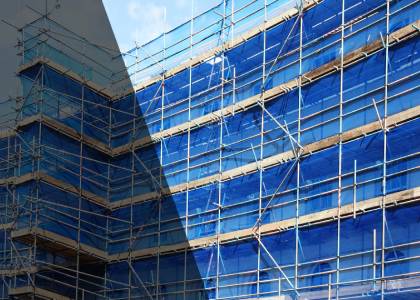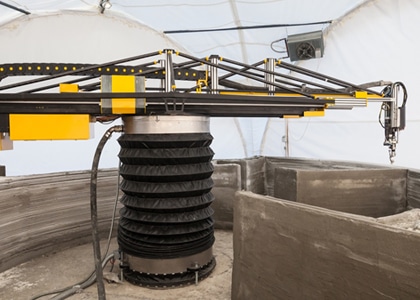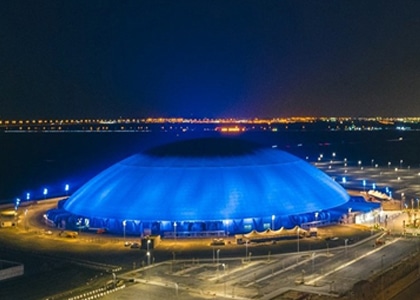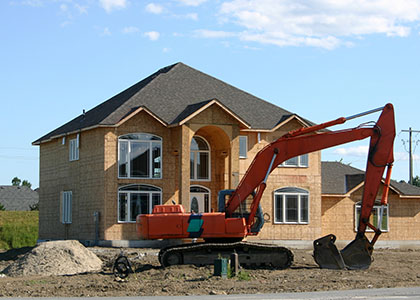Home / Blog / 6 reasons why local supply chains may be best for your business right now
SUMMARY
The region’s construction ecosystem has long been susceptible to disruptions. However, the COVID-19 pandemic has acted as an accelerator, speeding up the shift to what will now be the next “new normal” for the sector.
Post pandemic, the entire industry is changing how it operates as businesses like yours are weighing the risks for incumbents and reevaluating how quickly your suppliers can move to adapt to new and pressing requirements.
The truth is that the success of your projects is dependent on globalized supply chain networks that aren’t performing optimally right now—nor can one realistically expect them to until the end of (at least) 2021. As a business, you have to be working towards greater optimization, where you are served by minimum lead times at the lowest possible prices.
That’s why single-source supplier dependencies are becoming a thing of the past. Companies with poor flexibility in adapting to real-time shocks have been laid bare. What you need now to survive and work towards profitability is more supply chain elasticity through multi-level sourcing. That’s why smart businesses are moving from fluctuating globalized supply chains towards more regional players.
Here’s what you need to know so that you can make a more informed decision.
INDEX
- A changing sector needs local partners who understand the game.
- Added supply-chain control and value-chain integration.
- Helps you consolidate smarter as you plan recovery.
- Lean into collaborative efficiencies.
- Shorter lead times.
- Insight into local culture and an understanding of industry needs.
A changing Saudi construction ecosystem.
6 REASONS WHY LOCAL SUPPLY CHAINS MAY BE BEST FOR YOUR BUSINESS RIGHT NOW

The construction, material-sourcing ecosystem in Saudi has always been highly project-based, i.e., developed from unique customer specifications, using designs planned from scratch, and with a limited degree of repetition. Similarly, the value chain and player landscape have been highly fragmented both vertically and horizontally, resulting in a multitude of players involved at each step, with major interface frictions. The construction is carried out by generalists on-site, often in harsh environments, with a large part of the workforce being temporary and manual. And lastly, there is limited use of end-to-end digital tools and processes across the board.
But all this is changing in a post-pandemic world.
Businesses like yours that operate as public-private sector developers of real estate, infrastructure, and industrial projects, already incorporate financing, material sourcing and procurement, project management, and overseeing subcontractors into your job portfolio. Now as customer expectations evolve, you need to further specialize and invest in your product suite—especially if you hope to differentiate yourself from the competition.
That means walking away from a traditional way of doing things.
As the construction sector returns to normalcy, you need to offer increased product specialization if you want to attract new customers. And to do this properly you need to develop a deep understanding of what a future generation of customers wants.
One trend, therefore, to keep in mind, is that prefabrication and off-site produced components are about to become a game-changer in Saudi construction. Not only are they helping produce buildings that are quicker to construct, but they are also erecting structures that are greener, cheaper, and more sustainable.
What’s more, the pandemic-related quarantines have further opened the Saudi construction industry’s eyes towards its crippling dependence on manual labor. Recall that at the peak of the crisis, worksites were reduced to under 30% of the workforce, subject to frequent temperature checks, and held to strict distancing SOP’s. That’s why digitalization, AI, drones, smart tech, and IoT are slated to make a big entrance into mainstream construction.
At a time like this, you need to ensure that all your contractors are not only focusing on lean execution that manages costs for you but that they are also tightly integrating within the rest of your value chain by offering specialization in their segments. For example, providing expert and specialized scaffolding support for newer kinds of building materials and methods of construction. This means that while you definitely have to up your ante, your material suppliers and scaffolding subcontractors also need to get on board with newer offerings if you hope to make yourself stand out from the competition.
That’s why it’s a good idea to revisit the design of your scaffolding supply chains towards more local and regional players. So that if there are any future crises you can benefit from proximity, agility, flexibility, and quicker response.
Detailed below are additional advantages of moving your supply chains locally.
- A changing sector needs local partners who understand the game.

As the construction industry resurrects itself and finds new clients, it’s become clear that developers are promoting ‘branded’ offerings—this means that structures and surrounding services are delivered and marketed as standardized “products.” Consider, for example, customizable designs delivered through modularized elements and components that are produced off-site but assembled on site. You need local, on-ground scaffolding support to help you not only market these specialized product offerings but also navigate these new kinds of construction methodologies on site.
- Specialization: Another trend that is becoming apparent in Saudi construction is that if companies want to improve the margin and levels of differentiation, they will need to specialize in niche segments, such as luxury single-family housing, multistory residential buildings, hospitals, or processing plants to help them build competitive advantages. And like we’ve mentioned above these companies will also need to navigate their way around different materials and methods of construction. So, you need a scaffolder who understands that every project needs a different approach. A traditional one-size-fits-all system will no longer cut it. The shift toward specialization will also require companies to develop and retain knowledge and capabilities to maintain this competitive advantage. That’s why building local supply chains and nurturing and developing them to a level of mutual compatibility is the only way forward for businesses. To do this right, you will need to carefully weigh the efficiencies of candidate companies.
- Transparency: What’s more, as local supply chains and value-chain control and integration reduces the friction that comes with international suppliers, a Saudi-based scaffolder can help make processes more agile. By sourcing local, you maintain and sustain alliances better and more efficiently because of increased transparency along every aspect of the relationship, (especially procurement processes) leaving you less vulnerable to quality control issues.
- Exclusivity: In addition to helping you offer product specialization a strategic local partnership can give you market exclusivity. As you hone a suite of product offerings, a well-established scaffolder can help you further meet a project’s specific parameters. This kind of exclusivity can set you apart from the competition and make you a distinctly recognizable brand.
- Added supply-chain control and value-chain integration.

One thing is clear post-pandemic: construction companies will need to execute more control and ownership across the important activities in their value chain. This includes design and engineering, select-component manufacturing, supply-chain management, and on-site assembly. And truthfully, this can only be done through vertical integrations, strategic alliances, and partnerships with companies who have aligned incentives and goals—companies who are on the same level of deliverables as you.
- Increased digital integrations: It’s no secret that post-pandemic digital technologies are making their way into Saudi construction in a bigger way. They are particularly changing the interaction model. BIM, though already in use across the industry, is now leading to more decision-making earlier on in the process. Local scaffolders who are on the same platforms can deliver through similar end-to-end software solutions. They can mobilize advanced logistics management—which in turn, gives you better control, integrated value across offerings, as well as agility across supply chains.
- Scalability: Sourcing local also allows easier scalability, as well as the ease of stocking extra supplies. Importing from overseas means you need to order large quantities for the scaffolding to be worth the investment of time and resources. However, planning and budgeting for large-scale deliveries when you are already pressed financially is not an option right now. As each individual unit has to meet the Kingdom’s local market’s specifications and standards, you want the ease of a professional supplier who is flexible enough to rise to the occasion.

- Helps you consolidate smarter as you plan recovery.
The growing demand for specialization—especially the use of new materials, digitalization, technology, and facilities—requires higher industry standards and repeatability from businesses. Even with digital connectivity, scaffolding is one area of construction where it’s easier to deliver on your projects if your supplier is local. It also helps you consolidate smarter—both within specific parts of your value chain and across.
This is particularly useful as you can bundle scaffolding specialization as a subset when you market your construction services in a sector that is trying new ways of doing things. It sells you as a compelling brand with added attributes—a company that understands product and service quality, value, timing, reliability, new offerings, and warranties.
- Lean into collaborative efficiencies.
Most smart companies in Saudi’s construction sector are investing in technology, facilities, and human resources. Construction sites are expected to become more capital intensive, using advanced automation equipment and drones, among other technologies. R&D is becoming more important and companies are increasing spending to develop new and innovative products.

This means that you too need to build and retain in-house resources if you want to remain successful. Scaffolders who are upgrading digitalization processes and investing in human resources to build the necessary capabilities are partners you want working with you. When these resources are local you have quicker, easier and cheaper access to them.
- Shorter lead times
Perhaps the biggest advantage of sourcing local is that it reduces lead time on materials. It’s a good idea to keep in mind that in 2020, 300 construction projects were put on hold as the country went into coronavirus-related lockdowns. Now with a vaccine rollout underway across the Kingdom, businesses are hoping to make up for the lost time.
The truth is right now no one has time to navigate long timelines, international logistics, shipping, transportation, and warehousing into their schedules. You want to be able to access supplies and goods faster and at cheaper rates.
Going with a local supplier, therefore, helps you mitigate disruptions to international supply chains. Even now, international logistics are staggering amidst the second wave of the pandemic. An over-reliance on an overseas supplier can result in significant problems that leave you open to technical and industrial issues, border clearances, and import/ export restrictions—areas that are still subject to constantly changing protocols and rules.
- Saves you sourcing and warehousing worries: What’s more sourcing from international suppliers is only a viable option if you have bulk warehousing and storage facilities, with inventory management running months ahead of the task. If you don’t, then you can’t afford delays that further disrupt project schedules and leave you strapped for supplies.
And as most construction businesses are currently scrambling to deliver on projects while soliciting new work, they don’t want a business model built on third parties which leaves them open to additional vulnerabilities. No one has the time and energy to commit to navigating international import protocols or dealing with tariff and tax structures. These are time-consuming details that take focus away from your main line of work. Sourcing from near home means you are using companies who already have optimized facilities to stock and store materials.
- Insight into local culture and an understanding of industry needs.
Saudi is a nuanced construction market. Its Vision 2030 mega projects have injected the industry with a lot of capital, but as such, the sector is still finding its feet when compared to international markets and cultural differences in business approaches still apply.
It’s difficult to navigate your requirements with partners who don’t understand this. Pitching for construction tenders can be frustrating when foreign suppliers aren’t familiar with the requirements of your market. Similarly, local scaffolding certifications and safety labels require a company that is investing in, and perpetually educating its workforce through trainings and workshops to ensure a higher standard of operations. You need someone who gets this so that your site remains accident-free and safe.
A changing Saudi construction ecosystem.
As a construction business, your job is to focus on managing overall building work, your general contractors, coordinating between your subcontractors and suppliers, and handling all project-related risks. An unfortunate fact is that most companies operating in the Kingdom right now have a limited degree of specialization. You can’t afford to worry about how your scaffolder is performing. You need contractors who are reliable, and who can take on and deliver on nuanced tasks.
What’s more, the threat from a changing construction ecosystem is real. The generalist contracting sector faces some of the most imminent danger to their business model as work shifts from job sites to off-site facilities. Up to 80% of the traditional labor activity in a modular building project can be moved off-site. Some of the most skill-intensive and expensive types of work, such as mechanical, electrical, and plumbing, can be handled by lower-cost manufacturing workers.
If you hope to stay alive as a business, you have to evolve—that is the plain and simple truth of it. You need to upgrade to offer clearer specifications earlier in the project timeline through BIM systems and other digital tools. Only then will you be able to attract clients and deliver on your project-management needs. Without this level of in-depth clarity submitted at the onset, you won’t be able to articulate deliverables. And right now, no one wants to be investing money into something where every detail is not outlined.
So, you want partners who are best able to adjust their business models in line with the shifts projected ahead. Who can:
- Deliver product specialization to cater to end-users who may be choosing entire designs or specific components from both a library of options developed in-house, as well as those ordered externally on the market.
- Focus on lean, on-site execution and assembly and disassembly of formworks and structures.
- Use data and analytics to optimize costs and design.
When you choose a local, well-connected comprehensive scaffolder, you are able to leverage all this and more. You get lower costs, the latest developments, and a wider choice while avoiding longer lead times, clashes between legal and business cultures, loss of control, and other disadvantages that come with outsourcing overseas.

To find out how SSF can help support your construction projects, get in touch with us.












